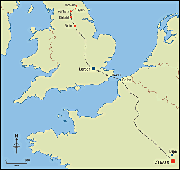 |
 |
 |
 |
 |
 |
 |
|
Duties to the state (15/15) The Cistercian abbeys in England and Wales were affected by political affairs throughout the Middle Ages, but developments in the mid-thirteenth century had a considerable impact and in many ways changed the nature of the abbot’s role. The turning-point was in 1265 when Simon de Montfort summoned over one hundred prelates to attend his parliament at Westminster. This was a momentous occasion for previously only eleven prelates and twenty-three magnates had attended parliament. The abbot of Rievaulx was amongst those who were invited (at least six of the Yorkshire Cistercian abbots were summoned), and from now on he, like other heads of religious houses, would be considered a political figure who was expected to lend counsel and aid in these turbulent times.(40) To attend these meetings of parliament, the abbot would have had to make the arduous journey to Westminster, which was not only time-consuming and expensive, but potentially dangerous with the threat of robbers. Moreover, he would be expected to provide the king with aid, i.e. money, when required. This additional burden was relatively short-lived for it seems that the Yorkshire abbots had more-or-less stopped attending parliament well before the mid-fifteenth century and that by 1483 the Cistercians had been formally released from this duty.(41)
|
